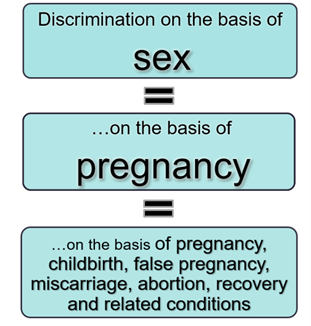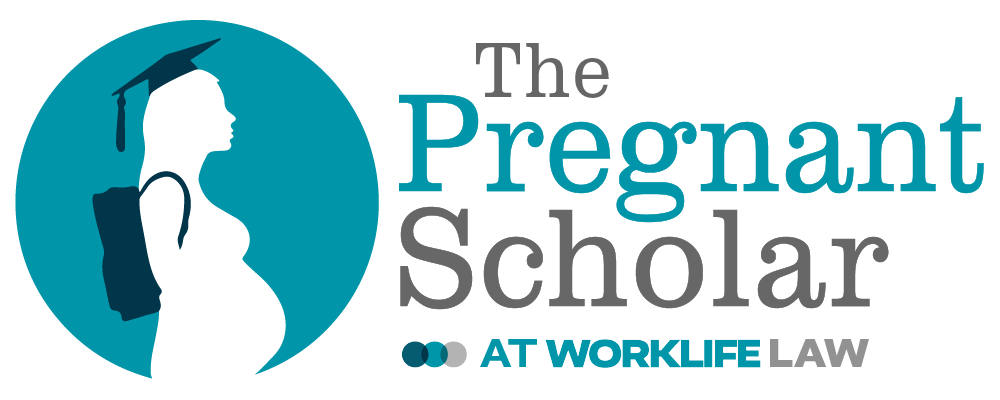
Abortion and Miscarriage
Title IX, the nationwide law against sex discrimination in education, protects students who are or were pregnant by prohibiting harassment and discrimination and guaranteeing certain accommodations relating to pregnancy. This also includes students who have an abortion or experience a miscarriage or other pregnancy loss. (Note, the Title IX regulations refer to “termination” of pregnancy, which is a technical term that includes miscarriage, stillbirth, and abortion.)
The current Title IX regulations state that:
“A recipient shall not discriminate against any student, or exclude any student from its education program or activity, including any class or extracurricular activity, on the basis of such student’s pregnancy, childbirth, false pregnancy, termination of pregnancy or recovery therefrom…” 34 CFR 106.40(b)(1)

While many states now have restrictions that make it more difficult to access abortion and miscarriage care, those restrictions do not change Title IX, which is a federal law that applies nationwide. As a student navigating pregnancy-related conditions, you are entitled to academic modifications, medically-necessary time off, and non-discrimination. Keep reading to find out more.
Important note: religious schools, colleges, and universities can be exempted from Title IX requirements. Learn more here.
Absences
Under Title IX, your school, college, or university should excuse absences related to pregnancy, childbirth, miscarriage, or abortion. You are entitled to absences–such as missing classes for medical appointments or arriving late due to nausea, so long as your healthcare provider says the absence is “medically necessary.” After taking time off, you should be allowed to return to the same status you held before; students should be given a fair opportunity to make up any work or exams missed.
What is considered “medically necessary” for purposes of Title IX is not based on the laws governing abortion in your state; it is not a judgement of whether the care you needed was essential to protect your life or guard against permanent impairment. Also, whether leave is “medically necessary” is not up to your professor or administrators at your insitution. Instead, whether your time off is “medically necessary” (and therefore must be given without penalty) is up to your own physician and can include any absence necessary for the treatment plan you and your provider decide on.
Absences can include time off to address pregnancy/postpartum symptoms, medical appointments (including transportation to those appointments), as well as time off to recover from any treatments or procedures related to pregnancy. Recovery can include physical as well as mental health recovery.
How to request excused absences:
The process will vary from class to class and college to college. If you believe you may suffer academically because you need absences related to a miscarriage or abortion, you can inform your instructor that your absence should be excused under Title IX because it was medically-necessary and related to pregnancy. If you feel safe doing so, you may want to inform them over email to document your request and to limit additional questions, if those would cause you discomfort.
You can also request help from your Title IX Coordinator. These administrators are required to assist you in having equitable access to education in light of your health needs, including arranging modifications you may need. For more on the documentation you may need to provide, and how your privacy will be protected, see the sections below.
If you need assistance, you can contact the Pregnant Scholar for help.
Academic Modifications
Title IX requires educational institutions to provide accommodations for pregnancy, termination of pregnancy and related conditions, like the end of a pregnancy and your recovery from it. For example, some students are not ready to return to class in person following a pregnancy loss and want access to virtual learning options. Others may be ready to return but need additional bathroom breaks or lactation breaks. If you need a change at school to allow you to fully recover, that is referred to as an “academic modification,” “adjustment,” or “accommodation.”
How to request accommodations/modifications:
To access modifications, the first step is to identify what changes to your educational program would be the most helpful in meeting your health needs. Then, you can reach out to your college’s Title IX office to request the changes. You could ask your faculty members directly, but please note that not all faculty are trained on providing pregnancy-related modifications to students, while it is the job of the Title IX Coordinator to do so.
To get an accommodation, you may be asked to provide a doctor’s note explaining your health needs and the accommodations that would to help your recovery. If the professor or Title IX coordinator finds it would fundamentally alter the educational program to make the change you request, and your proposed changes cannot be implemented, they should provide alternatives to consider. You may need to have several discussions to determine an accommodation that works for both you and the college. Then, your professors must make the changes for as long as needed to protect your health.
The Pregnant Scholar has created this guide to medical documentation and template form to help students access the modifications they need.
For more on your rights to academic adjustments, see our page on accommodations.
If you need assistance, you can contact the Pregnant Scholar for help.
Documentation and Privacy
Your college may ask for documentation of your health needs. The law on what documentation is acceptable can be complex. If you have received a request for information that you aren’t comfortable with, reach out to your Title IX Coordinator, or contact us.
Discrimination and Harassment
Title IX requires schools, colleges, and universities to protect students from discrimination and harassment related to their pregnancy, including abortion, miscarriage or other pregnancy loss. That includes discrimination or harassment from professors, administrators, other employees, and even students. If you are being penalized or made to feel unwelcome or unsafe on campus due to your pregnancy, pregnancy loss, or abortion, that may be illegal under federal law. Your school must take action to protect you. You are entitled to continue your education without discrimination or harassment.
If you are being discriminated against and need help, contact us.



